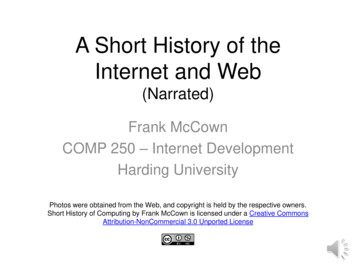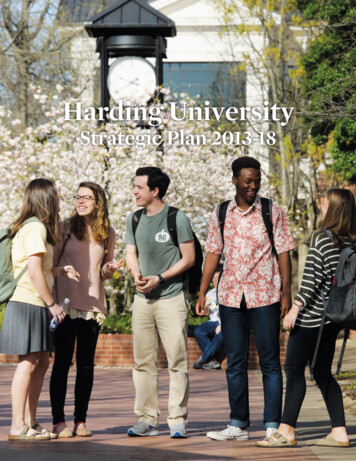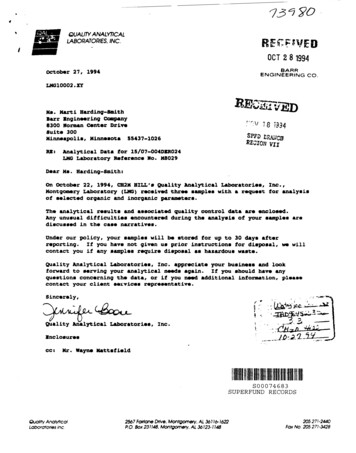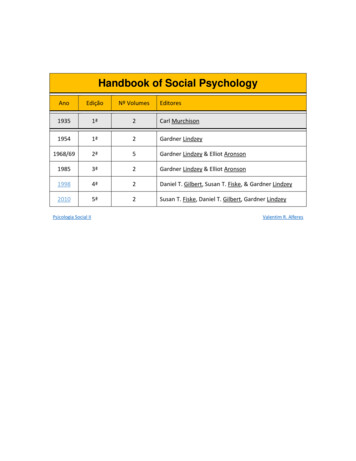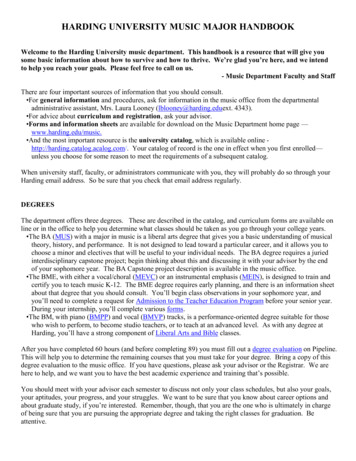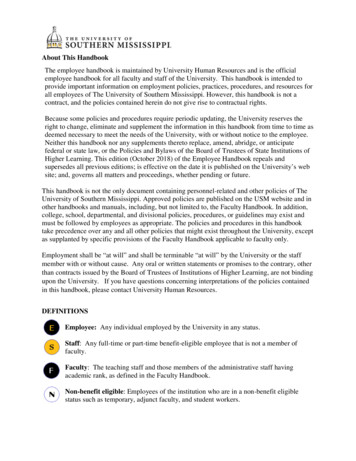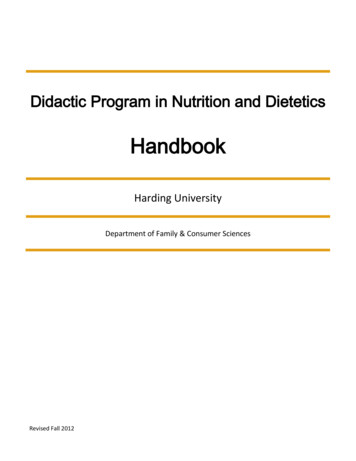
Transcription
Didactic Program in Nutrition and DieteticsHandbookHarding UniversityDepartment of Family & Consumer SciencesRevised Fall 2012
2Didactic Program in Nutrition and Dietetics (DPND) HandbookTable of ContentsStatement of Accreditation Status . 3MissionUniversity . 3Department . 3Didactic Program in Nutrition and Dietetics . 4Goals of the Didactic Program in Nutrition and Dietetics . 4Program Outcome Measures . 4Credentialing Process . 5Student Membership in the Academy of Nutrition and Dietetics . 5Harding University Student Academy of Nutrition and Dietetics . 5Preparation for Application to Supervised Practice Programs . 6Policies and ProceduresAdmission to Harding University . 6Academic Calendar. 7Tuition and Fees . 7Graduation/DPND Completion Requirements . 8Verification Statement Procedures . 9Protection of Privacy of Student Information . 10Student Support Services . 10Academic Grievance Procedure . 11Assessment of Prior Learning . 13Formal Assessment of Student Learning. 14DPND Retention and Remediation Procedures . 14Disciplinary/Termination Procedures . 16AppendicesA: Nutrition and Dietetics Factsheet . 22B: Nutrition and Dietetics Degree Plan . 24C: Statement of Student Understanding . 26
3Didactic Program in Nutrition and DieteticsDepartment of Family and Consumer SciencesHarding UniversityThe Didactic Program in Nutrition and Dietetics at Harding University is accredited by the Accreditation Council forEducation in Nutrition and Dietetics, the accrediting agency for the Academy of Nutrition and Dietetics, 120 SouthRiverside Plaza, Suite 2000, Chicago, Illinois 60606-6995, (800)877-1600, ext. 5400.Mission of the UniversityHarding’s mission is to provide a quality education that will lead to an understanding and philosophy of life consistentwith Christian ideals. This involves the following goals: Generally, the integration of faith, learning and living (developing the whole person through a commitment toChrist and to the Bible as the Word of God, an emphasis on lifelong intellectual growth, and theencouragement of Christian service and world missions through a servant-leadership lifestyle).Specifically, the development of Christian scholarship (while acknowledging dependence on God, stressingChristian commitment to intellectual excellence through a strong liberal arts foundation and effectiveprofessional preparation).The promotion of Christian ethics (creating an atmosphere that emphasizes integrity and purity of thought andaction).The development of lasting relationships (fostering personal and social relationships through interactionamong faculty, staff and students; and stressing a lifelong commitment to marriage and the Christian family).The promotion of wellness (emphasizing that the body is the temple of the Holy Spirit and that lifetime healthhabits contribute to a better quality of life).The promotion of citizenship within a global perspective (developing a Christian understanding of and respectfor other cultures through an emphasis on liberty and justice).Mission of the Department of Family and Consumer SciencesThe mission of the Department of Family and Consumer Sciences is to prepare Christian professionals to assumeleadership roles that support the quality of life of individuals and families in contemporary society. The department’svision is to empower individuals, strengthen families and enable communities. In congruence with the mission of theUniversity and the standards of the American Association of Family and Consumer Sciences, the department seeks to:1. Provide opportunities for students to develop their God-given talents for service to individuals, families,communities and the church;2. Enhance students’ growth in the fruit of the Spirit through daily interaction and classroom strategies;3. Prepare students for diverse careers in family and consumer sciences;4. Provide a solid foundation for students who pursue advanced study;5. Prepare students for a lifelong commitment to learning and professional development; and6. Contribute to the preparation of professionals in other disciplines.
4Mission of the Didactic Program in Nutrition and DieteticsThe mission of the Didactic Program in Nutrition and Dietetics at Harding University is to provide an academicallychallenging program, consistent with Christian ideals, as the students’ first step toward becoming Registered Dietitians.This program prepares graduates for success in supervised practice, advanced study, and careers in nutrition anddietetics.Goals of the Didactic Program in Nutrition and DieteticsThe Didactic Program in Nutrition and Dietetics will produce graduates that:1. Have the foundation knowledge for entry into a ACEND (Accreditation Council for Education in Nutrition andDietetics) accredited post-baccalaureate supervised practice program.2. Possess the foundation skills for entry into a ACEND (Accreditation Council for Education in Nutrition andDietetics) accredited post-baccalaureate supervised practice program.3. Have a solid foundation for advanced studies.4. Find employment.Program Outcome MeasuresMeasures of program success, as determined by the Accreditation Council for Education in Nutrition and Dietetics, andby the faculty of the Didactic Program in Nutrition and Dietetics are as follows:Program Completion 80% of enrolled students will complete program requirements within 150% of the time planned for completionduring the degree audit, which is completed at 45-60 earned hours. (Time planned for completion is twoyears; 150% of that time would be three years.)Performance of Graduates 80% of those applying to supervised practice programs the academic year they complete the program will beaccepted. 85% of graduates who seek admission to graduate schools will be accepted unconditionally. 70% of graduates who seek employment in nutrition and dietetics will be placed within 3 months followinggraduation.Pass Rate 80% of graduates taking the Registration Examination will pass on the first attempt.Other Measures include: 70% of graduates responding to the alumni survey will “strongly agree” or “agree” that they were wellprepared for supervised practice with no student indicating “strongly disagree.” 70% of Dietetic Internship (DI) directors responding to the DI director survey will rate the graduates as “Veryprepared” or “Adequately prepared” for supervised practice on all criteria. 70% of Dietetic Internship (DI) directors responding to the DI director survey will answer yes to this question:“As a result of this individual’s performance, would you accept another intern from the Harding UniversityDPND?” 70% of graduates with the nutrition and dietetics degree responding to the alumni survey will “strongly agree”or “agree” that they were well prepared for advanced studies with no student indicating “strongly disagree.” 80% of graduates responding to the alumni survey will “strongly agree” or “agree” that they were wellprepared for entry level positions with no graduate indicating “strongly disagree.”
5 80% of employers/supervisors responding to employer survey will rate the graduates as “Very prepared” or“Adequately prepared” for the entry-level employment.Credentialing ProcessThe Didactic Program in Nutrition and Dietetics is the first step in the process of becoming a Registered Dietitian. Upongraduation, the student will receive verification that they have completed the foundation knowledge and skills requiredby the Accreditation Council for Education in Nutrition and Dietetics.In order to become a Registered Dietitian, the student will take the next step in the process. This step involvescompletion of a supervised practice program in order to be eligible to take the national Registration Examination forDietitians administered by the Commission on Dietetic Registration (CDR). (See Appendix A for Nutrition and DieteticsFactsheet) Individuals may then apply for state licensure (process varies by state).Students who have completed coursework in an ACEND-accredited didactic program in nutrition and dietetics may alsochoose to become a Dietetic Technician, Registered (DTR). The next step for these individuals would be the nationalRegistration Examination for Dietetic Technicians, Registered, also administered by the Commission on DieteticRegistration (CDR).Student Membership in the Academy of Nutrition and DieteticsStudents enrolled in a ACEND accredited nutrition and dietetics education program may join the Academy of Nutritionand Dietetics as student members. Dues are 50 per year (June-May), and an online application is available aspx?id 8141Benefits of student membership in the Academy include networking with other nutrition and dietetics students andprofessionals, leadership opportunities, free membership in the state dietetic association, online access to the Journalof the Academy of Nutrition and Dietetics and other publications, and reduced rates at professional meetings andconferences.Harding University Student Academy of Nutrition and DieteticsThe Harding University Student Academy of Nutrition and Dietetics (SAND) is open to any student majoring in nutritionand dietetics. Students may join at any time during the academic year by attending one of the scheduled meetings, orby contacting a SAND officer or sponsor.The Student Academy of Nutrition and Dietetics meets monthly. Meetings may include guest speakers of professionalinterest, planning or participating in campus or community service projects, etc. SAND maintains a bulletin board aswell as a Facebook page for dissemination of information and for highlighting current nutrition topics and activities.Faculty sponsor: Dr. Lisa Ritchie, lritchie@harding.edu, (501) 279-4677 (office)
6Preparation for Application to Supervised Practice ProgramsRecent match data from the Accreditation Council for Education in Nutrition and Dietetics indicates that the supply ofdietetic internships is not keeping up with the increasing demand. In April 2009, 50% of applicants were matched to aninternship in the first-round matching; see http://www.eatright.org/internship availability/ Students who areinterested in becoming Registered Dietitians should review this information in order to make informed decisionsregarding their career path. Students should also meet with the DPND Director to assess their progress toward theirprofessional goals. Suggestions to improve changes of getting a dietetic internship position are available athttp://www.eatright.org/internship suggestions/Students enrolled in Harding University’s Didactic Program in Nutrition and Dietetics are encouraged to seekopportunities to gain work experience, and experience under the direction of a Registered Dietitian, if possible.Sites/locations where students might look for work experience include: HospitalsNursing homesHealth department clinicsFoodservice operationsWellness centersFood-related companiesPolicies and ProceduresAdmission to Harding t.php?catoid 11&navoid catoid 11&navoid 1037&hl &returnto searchAdmission to Harding University is determined on an individual basis. Each candidate is evaluated based on academicpreparation and potential. Only students who appear capable of success at Harding are accepted for admission. Also,because of Harding’s rich heritage as a Christian university, we seek students of the highest moral caliber. An interviewis not a requirement for admission, but we strongly recommend one to ensure that there is a good match between thestudent’s interest and talents and Harding’s academic and non-academic offerings.Harding is committed to the policy of providing equal opportunity for all persons and does not discriminate inadmissions, programs, or any other educational functions and services on the basis of race, color, creed, national origin,sex, age, veteran status, religion or disability to those who meet its admission criteria and are willing to uphold itsvalues as stated in the Code of Conduct. In the area of employment, Harding does not discriminate on the basis of race,color, creed, national origin, sex, age, veteran status or disability. Harding, under federal guidelines and as reflected inits Articles of Incorporation, may discriminate as to religion and may adhere to religious tenets regarding the limitationof employment of women in certain preaching and minister roles.Based upon this commitment, Harding follows the principle of nondiscrimination and operates within applicable federaland state laws prohibiting discrimination. As a recipient of federal financial assistance, Harding is required by Title IX ofthe Educational Amendments of 1972, as amended, not to discriminate on the basis of gender in its admission policies,treatment of students, employment practices or educational programs except as required by religious tenets of thechurches of Christ. Harding has a nondiscrimination policy available upon request in the offices of Student Life and
7Human Resources. Inquiries concerning the application of federal and state laws or regulations may be referred to theOffice of Human Resources, Box 12257, 915 E. Market Avenue, Searcy, AR 72149-2257; telephone (501) 279-4380. Theperson to ensure compliance with the nondiscrimination policy and discrimination laws and regulations is the chieffinancial officer of the University.The Office of Admissions Services provides comprehensive assistance to prospective students. For an application packetand other information, contact the Office of Admissions Services by mail at Harding University, Box 12255, Searcy, AR72149-2255; by phone at 1-800-477-4407 (toll free); by fax at (501) 279-4129; or by e-mail at admissions@harding.edu.Enrollment at Harding is limited, so early application is encouraged.Online Application: The application for admission can be completed online at www.harding.edu/admissions. Allsupporting documents can be printed or submitted online, as well.Academic CalendarThe academic calendar is available at http://www.harding.edu/calendar/ The Didactic Program in Nutrition andDietetics adheres to the Harding University calendar in regard to all course offerings, vacation, and holidays.Tuition and catoid 11&navoid 1049&hl &returnto searchHarding University, a private institution without benefit of tax support, must meet its operating costs by income fromstudent tuition and fees, government grants, auxiliary enterprises, gifts and endowment earnings. The cost ofattending Harding is moderate compared to many colleges and universities of the same size and quality.Admission Fees: Two fees should accompany the Application for Admission — a 40 application fee and a 125housing/security deposit. These may be forwarded as one check or money order for 165 made payable to HardingUniversity. The application fee is nonrefundable and is designed to cover the cost of application processing. Thehousing deposit will be used to reserve a room each semester and as a security deposit against damage. Thehousing/security deposit will be refunded for residence hall rooms if your reservation is canceled before May 1 for thefall semester, Oct. 1 for the spring semester, or April 15 for Summer Session. Commuting students should file only the 40 application fee. Married students applying for campus housing should file, in addition to the 40 application fee, a 125 apartment reservation deposit for a total of 165. The apartment reservation deposit for Harding VillageApartments is 200. The apartment reservation deposit is refundable if the reservation is canceled 30 days beforeoccupancy date.Typical Expenses: A typical resident student taking 15 hours per semester can meet all regular expenses of tuition, fees,room and food service for 20,692.00 for the school year. A non-boarding student can meet expenses of tuition andfees for 14,610. Students should be aware that laboratory/course fees, parking permits, textbooks, etc. are notincluded in the schedule of expenses. Additionally, upper level DPND students will be required to purchase alaboratory coat for practicum experiences and food science laboratories.Technology/Academic Enrichment Fee: Each full-time student (10 or more hours) will pay a special fee of 225 perterm as a Technology Academic Enrichment Fee. Students taking 9 credit hours or less will pay 22.50 per credit hour.
8Additional Fees for DPND Students: Additional fees incurred by the DPND student include a criminal background check( 10 ) and liability insurance ( 63), both added as course fees to FCS 300; and a fee for access to the online NutritionCare Manual ( 60), course fee for both FCS 420 and 424.Food Service: Food service ranges from 499 to 1,735 per term, depending on the meal plan selected. For informationregarding each plan and cost refer to www.harding.edu/businessoffice/Married Student Housing: Married student housing is available. Contact the Office of Residence Life.Scholarships are provided by many generous donors. A list of scholarships, endowment, and loan funds is available htmlRefunds: Students are granted admission with the understanding that they are to remain for a full term. A student whoenrolls in a class but does not attend or stops attending and does not officially withdraw may not receive a refund. Anofficial withdrawal from the University begins in the Student Life Office. A refund of tuition will be made based on thefollowing schedule. (Days indicated are days of the term, excluding Saturday and Sunday.)Day 1-5Day 6-10Day 11-15Day 16-20Day 21-25Day 26-end of term100 percent refund of tuition80 percent refund of tuition60 percent refund of tuition40 percent refund of tuition20 percent refund of tuitionNo refund of tuitionTuition Refund Plan: A protective insurance program provided by DEWAR Insurance Company is available andenrollment is voluntary. The policy will minimize the financial loss for students who suffer a serious illness or accidentand have to leave the University. Application is processed online at www.collegrefund.com.After a student withdraws from the University, room and board will be refunded on a pro rata basis. No refunds forboard will be made for absences while enrolled in the University.Appeals related to this refund schedule, complete with appropriate documentation, must be filed on the TuitionRefund Appeal form within one month of the date of withdrawal. Appeal forms are available in the Office of theRegistrar.If a student’s withdrawal is the result of misconduct, the institution is under no obligation to make any refunds.Graduation/DPND Completion RequirementsStudents enrolled in the Didactic Program in Nutrition and Dietetics must successfully complete all graduationrequirements as listed in the Harding University catalog. (See Appendix B for Nutrition and Dietetics degree ?catoid 11&navoid 1051&hl &returnto searchStudents must file a “Request to Graduate” form and a signed degree evaluation with the Registrar’s Office within twosemesters of graduation, but no later than completing 110 credit hours. Spring or summer graduates must file therequest to graduate by October 1 in the fall semester of the senior year. Fall graduates must file by March 1 in thespring semester of the senior year. Failure to file a request for degree in a timely manner may result in the student notbeing approved to walk in the commencement ceremony.
9Upon filing a request to graduate, the following minimum requirements for graduation will be evaluated for allstudents:1. Complete and pass all courses required for the B.S. in Nutrition and Dietetics (130 hours). See current degreerequirements athttp://harding.catalog.acalog.com/preview program.php?catoid 11&poid 523&hl &returnto search2. Complete and pass 96 hours of formal instruction (classroom instruction, independent study, co-op and fieldwork, contract courses, validation, correspondence courses). Credit earned without formal instruction (AP,CLEP, IB, credit by examination) does not count toward the 96.3. Complete and pass 45 hours of upper-level work (courses numbered 250 and above at Harding).4. Complete and pass 32 hours in residence at Harding.5. Complete and pass 23 of the last 32 hours in residence at Harding.6. Grade Point Average Requirement:1. Earn a cumulative GPA of 2.0 or higher on all work.2. Earn a major GPA of 2.0 or higher in the major.3. Earn an institutional GPA of 2.0 or higher in all work taken at Harding.4. Earn a cumulative GPA of 2.0 or higher in all courses taken at Harding in the major.7. Earn 9 upper-level hours in their major (for a Bible major, 10 hours) at Harding.8. Earn 60 hours at a four-year institution.9. Complete and pass all Liberal Arts and major requirements as outlined in the Catalog. For the postbaccalaureate student, the liberal arts curriculum will be considered complete; however, the student mustmeet Bible graduation requirements.10. Complete and pass 8 hours of textual Bible coursework, which must include at least 2 hours each of both OldTestament and New Testament courses. (Students enrolled in more than 8 hours in a term must enroll in aBible class.)11. Satisfy the English Proficiency requirement by earning a grade of C or higher in both ENG 111 or ENG 113 andENG 211.1. CLEP and AP credit earned for ENG 111 will satisfy the ENG 111/113 requirement.2. AP credit earned for ENG 211 will satisfy the ENG 211 requirement.3. HNRS 201 with a C or higher substituted for ENG 111/113 or ENG 211 will satisfy the requirements forthat course.4. The requirement is waived for post-baccalaureate students.For purposes of minimum requirements for graduation, a registered student may use any catalog from the date of lastenrollment in the University up to and including the last year enrolled at Harding. However, a student may NOT so use acatalog that is more than eight years old at the time of student’s graduation.Graduation Honors: Graduating seniors who achieve at least a 3.5 cumulative GPA graduate cum laude. Those with acumulative GPA of 3.75 graduate magna cum laude, and those with a cumulative GPA of 3.9 or higher graduate summacum laude.Verification Statement ProceduresThe Verification Statement of Program Completion is used by the Commission on Dietetic Registration and theAcademy of Nutrition and Dietetics Membership Department to document completion of current programrequirements. The verification statement is critical to the determination of an individual’s registration eligibility status.In order to receive a verification statement from the Didactic Program Director at Harding University, the followingcriteria must be met:1. At least six hours from the Didactic Program in Nutrition and Dietetics (DPND) curriculum (upper level, fromDepartment of Family and Consumer Sciences) must be completed, in residence (on-ground), at HardingUniversity within two semesters of completion of course requirements. In the case of a transfer student,
10official transcripts documenting previous work must be submitted to the Registrar’s Office. All transfer workmust be equivocated with courses at Harding University by the Family and Consumer Sciences DepartmentChair and the University Registrar. In accordance with university graduation requirements, students mustcomplete and pass 23 of the last 32 hours in residence at Harding.2. All courses required by the Academy of Nutrition and Dietetics’ Accreditation Council for Education in Nutritionand Dietetics for the Didactic Program in Nutrition and Dietetics must be satisfactorily completed.The Declaration of Intent to Complete Degree and/or ACENDMinimum Academic Requirements is provided to astudent during their final semester, providing the above criteria are in progress. This statement is issued based uponcourses already completed as well as projected completion of required courses and degree. The Verification Statementof Program Completion will be provided to all students after completing program requirements. Once verification ofprogram completion is available from the Office of the Registrar, copies of the Verification Statement of ProgramCompletion will be mailed to the individual.Protection of Privacy of Student InformationThe Family Educational Rights and Privacy Act of 1974 (called FERPA) provides, with certain exceptions, (1) thatstudents shall have a right of access to their education records and (2) that education institutions shall not releaseeducation records to non-school employees without the consent of the student. “Students” as used in this noticeincludes former students.Right of Access. With few exceptions provided by law, students at Harding may see their education records uponrequest. Access will generally be granted immediately upon request to the record custodian, but if delay is necessary,the student may sign a “Request for Access to Student Records” and be allowed access sometime within 45 days of therequest. Students are entitled to copies (at the student’s expense) of records to which they have access. Studentsfurther have the right, under established procedures, to challenge the accuracy of the records and to enter theirviewpoints in the records. A list of all education records maintained by Harding and a copy of the University FERPAPolicy are kept in the Harding Office of Student Life.The University may not require students to sign a waiver of their right to access, but students should be aware thatrecommendations and evaluations may not be very helpful or candid without a signed waiver.A student’s home address and phone number will be made available to a roommate assigned to that person.Student Support ServicesStudent Health Services offers a walk-in clinic; no appointments are necessary. Services provided are symptomatictreatment for minor illnesses, such as colds, sinus congestion, headaches, upset stomach, aches and sprains; first aidfor accidental injury; blood pressure screening; and allergy injections, with physician approval. Students are assistedwith referrals and appointments to local health professionals. When the clinic is closed, help may be obtained from theResidence Life Coordinators or the Public Safety Office on Campus. Harding does not assume financial responsibility forprofessional services that require a physician; medical, surgical, or emergency services; or hospitalization. Students arefinancially responsible for any medical and/or prescription bills.Counseling resources and services are available at no cost to the student. A staff of six professional counselors isavailable to confidentially answer personal questions and provide counseling services as needed. The goal is to assiststudents as a part of the University’s mission to promote student success in all areas of life. Information is available atcounseling@harding.edu, ext 4347, or McInteer 313.
11TRIO Student Support Services is a Title IV program funded by the Department of Education. The Student SupportServices (TRIO SSS) program at Harding serves 275 students who are admitted to the program if they are Americancitizens or nationals, interested in the program’s services, and meet one or more of the following criteria:1. First-generation college student. Neither parent/guardian has obtained a baccalaureate degree.2. Financially qualified student. Eligibility is based on th
Riverside Plaza, Suite 2000, Chicago, Illinois 60606-6995, (800)877-1600, ext. 5400. Mission of the University Harding's mission is to provide a quality education that will lead to an understanding and philosophy of life consistent with Christian ideals. This involves the following goals:
